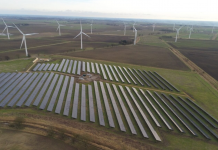 CCC says economic stimulus and policy efforts should focus on clean heat and boosting electricity network to accommodate electrification of heat and transport.
CCC says economic stimulus and policy efforts should focus on clean heat and boosting electricity network to accommodate electrification of heat and transport.
Delivering Britain’s recovery from the Covid-19 downturn means strengthening power networks and putting heat decarbonisation at the forefront of economic stimulus packages, independent climate advisers have urged government.
In a letter to PM Johnson and key ministers, the Committee on Climate Change identifies sectors requiring urgent action.
“Electricity networks must be significantly strengthened across the UK to accommodate electrification of heat and transport”, the CCC stated.
Grid investments must be pursued to widen bottlenecks and accommodate decentralised generation. Their costs can be “recovered through modest increases in customer bills over periods of several decades”, added the Committee.
This is not a new message: The CCC last year urged regulators to allow network operators to invest in fatter wires to enable the massive increases anticipated from electrification of heat and transport.
This week the National Infrastructure Commission joined the chorus, calling for greater urgency from government and regulators in upgrading power networks and pipelines.
To better join up renewable generation and demand, Britain has an “urgent need for measures to provide for more orderly onshoring of offshore wind power”, wrote the CCC. New hydrogen and CCS infrastructure will be needed to support the next phase of Britain’s net-zero transition, the body added.
While government is planning to make available grants to support installations of 25,000 heat pumps, the CCC said ambition much be much greater.
“As we emerge from the crisis, supply chains must be developed to extend the provision of whole-house retrofits including the roll-out of heat pumps and other low-carbon heating in all our homes. This must be supported by investments in skills, training and extending funding for heat pumps in homes off the gas grid to 2025,” it wrote.
“These projects can begin now, are labour-intensive, and have direct social benefits of more comfortable homes leading to improved wellbeing and health.”
A green recovery need not sit on public balance sheets, with measures achieved “often without direct public funding or else through co-financing to accelerate private investment, as part of a targeted stimulus package with lasting, positive impacts”.
Creating green-collar jobs will achieve economic and environmental recovery, while enabling the ‘levelling-up’ that the prime minister and his advisor appear keen to deliver. “Many green jobs are labour-intensive, spread geographically across the UK and will have high multiplier effects”, the letter continues.
CCC chair Lord Deben told ministers: “The Post-COVID-19 economic recovery presents an opportunity for governments, regulators and the industry to work together to accelerate much needed investments”.
Meanwhile, he urged governments not to bail out carbon intensive sectors without securing their commitment to take “real and lasting” action on climate change.
The CCC’s letter is here.
Related stories:
Climate Change Committee: Let DNOs install fatter wires
Net zero: How to decarbonise heat?
Net zero: Bristol’s £5bn decarbonisation plan
Committee on Climate Change recommends net zero emissions by 2050
Lift 6GW cap on offshore wind to hit net zero, says SSE
Click here to see if you qualify for a free subscription to the print magazine, or to renew.
Follow us at @EnergystMedia. For regular bulletins, sign up for the free newsletter.



